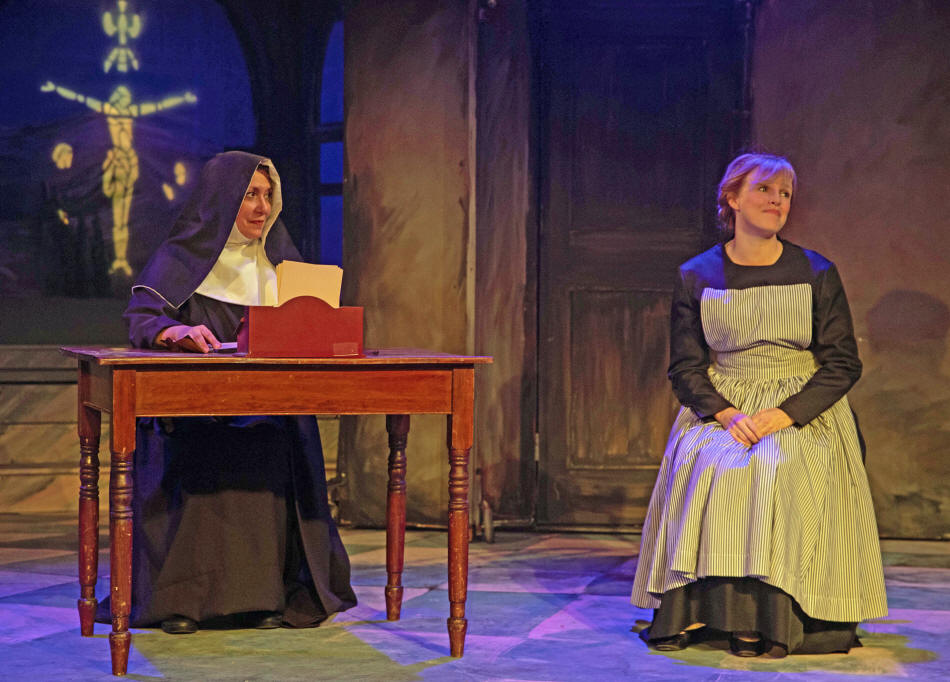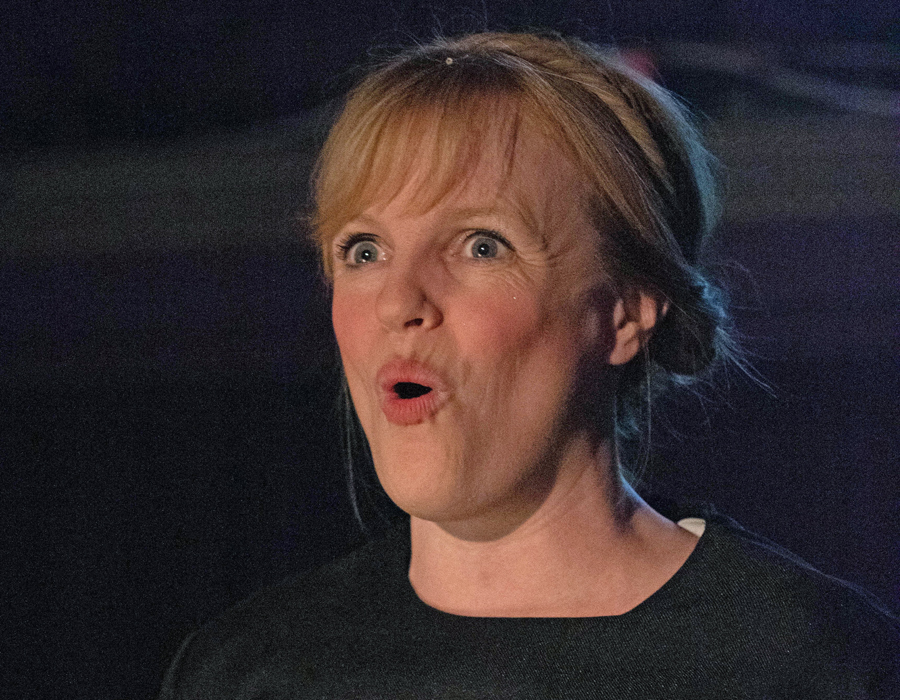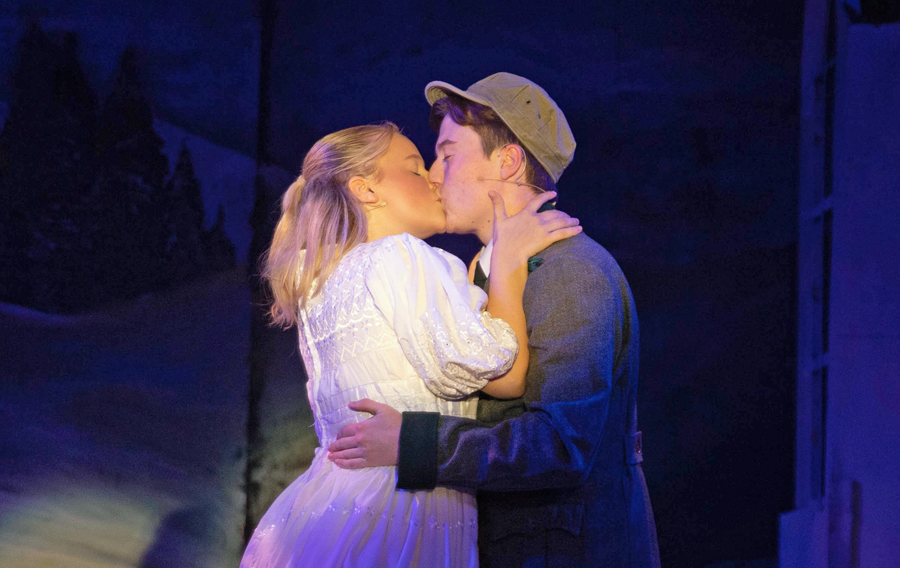
Liz Berriman as the Mother Abbess and Amy Davies
as the postulant Maria
The Sound of Music
Sutton Arts Theatre
*****
Some things are certain in the world of
amateur theatre, somewhere Ernest will be important, a murder will be
being announced, there will be noises being heard off . . . and
Sutton Arts will be performing a summer musical which once again
challenges the concept of amateur – The Sound of Music is that
good.
It raises the already high bar they have set over
the years another notch or two in a wonderful production of this
much-loved musical all led by a magnificent Maria in the shape of Amy
Davies, a newcomer to the company.
Amy is a drama teacher and lecturer, but the old
adage that those who can't teach flies out of the window, she is simply
superb, in a different class, living and breathing Maria every moment
she is on stage.
She has a note perfect, well trained voice, and
provides just the right amount of fun and mischief for the free-spirited
postulate Maria, sent as governess to the von Trapp children.
She is matched by the stern and at first
melancholy Captain Georg von Trapp, a widower and proud Austrian played
by Paul Westwood, an actor with plenty of professional experience, and
it shows with a confident and convincing performance as we see his mood
soften to Maria and harden to the impending Anschluss, the brutal Nazi
annexation of Austria in 1938.

Amy Davies makes the part of Maria her
own in a stunning performance
Then there is the splendid Max, played by Nick
Snowden, wearing a suit that could last have been worn by Ted Bovis in
Hi-di-Hi. You certainly would never miss him in the dark.
Snowdon's Max
is the Third Secretary of Education and Culture and spends his time
searching for acts for his annual Salzberg Festival . . . as well as
freeloading from his friendship with the wealthy Georg, with his fine
wines and food. He is both a pragmatist and an opportunist, looking
after his own interests and keeping on the right side of whoever is in
power until it, whatever it is, blows over.
As he puts it in his warning to Georg: “What’s
going to happen is going to happen. Just make sure it doesn’t happen to
you.”
He brings light relief to proceedings but beyond
his Vicar of Bray attitude, he really does care for the von Trapps and
will soon risk his life for them.
Love interest arrives in the elegant shape of
Laura Hinton as Elsa Schraeder, wealthy, sophisticated and running her
late husband's corporation in Vienna. Her pursuit of Georg could be seen
as a strategic marriage rather than a romantic one, and like Max she is
willing to take the safe course and, reluctantly, live, without making
waves, under the Nazi occupation – a fatal failing perhaps in Georg's
eyes.

Nick Snowdon as Max (left), Paul
Westwood as Georg and Laura Hinton as Elsa
In reality though, she is rather a sad figure,
her leaving an acceptance that Georg's happiness lies elsewhere once
Maria returns, perhaps she really did love him after all.
Another piece of the jigsaw is the Mother Abbess
played by Liz Berriman. She is the mother confessor and mentor to Maria,
protecting her and guiding her, and with her own make or break moment
for the success of the show.
She delivers the show-stopper to end act one, the
Climb Every Mountain finale, which will either send the audience to the bar
buzzing and uplifted . . . or downhearted and in need of a stiff drink,
and Liz lifted not only spirits but the rafters with a soaring
performance that brought out the goosebumps of admiration. She really
cracked it.
The von Trapps are a family though with seven
children . . . who on opening night were . . . stand up straight, get in
line, in order of age, name and number . . .
Liesl, the eldest, played with a mature charm by
Ava Cattell. She's 16 going on 17 and in that awkward, uncertain time
between girl and woman, infatuated with the young and socially awkward
Rolf, the telegram boy played by Olly Foster, young love's sweet bloom
complete with a song and dance number.
Next is Oliver Dawes as Friedrich (14) with that
same problem of adolescence to adulthood, still a boy yet wanting to be
seen as the man in the house.

Daisy Parsons as Louisa (13) is the family joker,
full of fun and mischief, with a penchant for leaving toads in the beds
of governesses and giving out the wrong names.
Kurt (10), played by Rory Kilbride, tries to be
grown up, but is still a little boy at heart while Lois Stokes's
Brigitta (9) not only calls a spade a spade, she tells it how she sees
it, tells the truth, even when people perhaps don’t want to hear it.
Then Lula McLoughlin's Marta (7) is the quite
one, we know little about her apart from the fact she wants a pink
parasol for her birthday and finally there is Gretl (5), the little dot
played by Ada Hodgson, who was immediately the audience favourite – the
benefit of being adorably little.
Seven youngsters who nailed it quite beautifully,
always animated, always keeping it real.
Hovering around we have Valerie Tomlinson as the
housekeeper Frau Schmidt and Kane Blundell as the butler and, enter
jackboots clicking, the local Gauleiter Herr Zeller, played by Patrick
Rayson, delighting in the cruel power awarded by his Nazi masters while
Foster's Rolf is another happy to assume power he never had by riding on
the Nazi bandwagon – but even he still has a remnant of decency left as
we are to discover.
Less brainwashed is Andrew Tomlinson as Admiral
von Schreiber, arriving to commission von Trapp in the German navy, a
military man above politics.

Doomed young lovers . . . Ava Cattell as
Liesl with Olly Foster as Rolf
There is excellent support from a large ensemble
and a shout out here to the nuns who open with a lovely a cappella
Preludium in Latin, hauntingly beautiful based on Psalm 110 (Dixit
Dominus) and sung wonderfully in full harmony. It is the only choral and
liturgical piece in the show, highlighting the world Maria is entering
at Nonnberg Abbey.
The wonderful Gladstone Wilson, the musical
director, on keyboard, marshals his seven piece band, and singers, with
his usual flair and skill, while set designer Mark Natrass and his team
have once more worked their magic in turning the limited Sutton Arts
black box stage into a theatrical Tardis hiding an abbey, a terrace, a
bedroom, a country house lounge and a concert hall in a puzzle of
sliding, rotating, twisting flats on a stage with no flies and no wings.
And it works,
David Ashton's lighting highlighted important
moments and a nice touch was projecting hills and trees on to the side
walls of the auditorium as Maria entered from the rear singing The
Sound of Music. The von Trapps made the reverse journey climbing
the steps through the auditorium in their escape to Switzerland.
The sound, Ashton again, with principals miked
up, is well balanced while Janine Henderson has created choreography to
hold interest without being too complex for an untrained cast with the
exception of the complicated Austrian folk dance, the Ländler,
danced by Maria and Georg, which is a bit of a don't try this at home
job.
The musical was the last by Rodgers and
Hammerstein and Edelweiss was Oscar Hammerstein's last song, He
was to die of stomach cancer nine months after the show's Broadway
opening in November 1959. Incidentally, he remains the only person named
Oscar to win an Oscar.
Emily Armstrong has done a simply magnificent job
in producing and directing a show of this quality, which leaves her with
a huge problem – how do you top that or even match it next year?
The hills will be alive to 28-06-25.
Roger Clarke
19-06-25
Behind the Arras's association with
The Sound of
Music goes back to our site's start in 2009. I knew the wonderful, late
Jean Bayless, the first Maria when The Sound of Music opened in
the West End in 1961 and talked with her about her role back then as Connie Fisher, the winner of BBC's How Do You Solve a Problem Like
Maria, arrived at Birmingham Hippodrome in the then touring versiom
of The Sound of Music in 2010.
The First Maria
|

